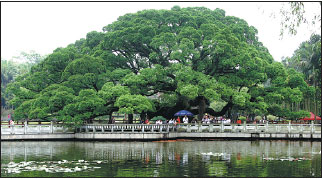Jasmine and banyan trees boast millenia of culture
Planting more trees and flowers with local characteristics and economic value will be a new move in Fuzhou's recent landscaping efforts, said local gardening authorities and experts.
According to the Fuzhou gardening bureau, the species to be planted mainly include jasmine - the city flower - and banyan - the city tree.
Jasmine can be regarded as a local plant as it has been in Fuzhou for more than 2,000 years, although its origins may be in ancient Persia or ancient India, said Qiu Taibin, a local gardening expert.
Qiu based his belief on an early Han Dynasty (BC 202-AD 220) book called Travelogue of Nanyue, which described the planting of jasmine in Fujian and Fuzhou.
He said: "Jasmine has been a crucial industry in Fuzhou since the Song Dynasty (960-1279) when locals began mixing dry jasmine flowers with tea to make a new tea product."
"Jasmine tea became immediately popular on the market because of its unique fragrance and its functions in healthcare," Qiu said, adding that the jasmine tea industry was constantly developing throughout the following millennium.
During the late Qing Dynasty (1644-1911), Fuzhou was one of the tea trading hubs of China, accounting for about 35 percent of the country's total tea exports. Jasmine tea was the bulk of the trade, according to Qiu.
In the late 1990s, there were nearly 1,000 companies in Fuzhou engaged in the production of jasmine tea.
In 2011, Fuzhou was recognized by the International Tea Committee as the "home of jasmine tea".
In 2014, the United Nations Food and Agriculture Organization deemed Fuzhou's jasmine tea a globally important part of agricultural heritage.
Also in 2014, the Fuzhou city government issued a regulation protecting jasmine, encouraging local residents to use it in their gardens, highlighting both its economic and landscaping values.
According to the Fuzhou Gardening Bureau, there are more than 1,000 hectares of jasmine plantations in urban Fuzhou and 1,200 hectares in its suburbs, which can generate 2 billion yuan ($288 million) of revenue annually.
Banyan trees
The banyan tree is another symbol of Fuzhou, as the city is also called the "city of banyan".
According to Qiu, Fuzhou got the nickname as early as the Tang Dynasty (618-907), when a poem referred to it as the city of banyan.
Qiu said banyan is a typical local plant, with value in both environmental protection and landscaping.
He said the tree has great vitality, allowing it to grow on barren land. Its boughs branch out wide and far, offering shade to people in hot summer.
"A Chinese saying goes that'a single tree doesn't make a forest'. But this is not true for a banyan tree, as its branches can come to form new trunks and branches to cover a wide area," Qiu said.
Since the late Tang Dynasty, local administrators have called on residents to grow banyan trees to create a better environment.
Chinese President Xi Jinping, who was Party chief of Fuzhou in the 1990s, has a special love for the banyan tree, saying it is a plant crucial to Fuzhou's environmental efforts.
The local residents have the same level of adoration for banyan trees.
"In the entrance of most villages in Fuzhou's suburbs, there is always a hundred-year-old banyan tree, offering locals a venue for meeting and relaxing with its ample shade," said Chen Zhiming, a retired teacher.
According to Lin Cheng, chief engineer at the Fuzhou gardening bureau, Chinese people tend to personify natural things like trees and flowers and seek values and inspiration from their characteristics.
The far-reaching branches of the banyan symbolize reproductivity, and its vitality and shade suggest values of inclusiveness and entrepreneurship.
Lin said there are also benevolent personifications of jasmine, as the small, purely white and fragrant flower suggests moral purity and a lowkey attitude.
"Banyan and jasmine are selected as our city tree and city flower also because they reflect the values of Fuzhou people," Lin said.
According to the gardening bureau, six banyan-themed and seven jasmine-themed parks will be built in Fuzhou by 2018. It said the newly added green areas in the city will reach 1 million square meters by the same year.
Contact the writers at zhaoshijun@chinadaily.com.cn
|
This banyan tree, with a canopy shading about 1,300 square meters, is called the "Banyan King" by the locals. Legends say it was planted by Zhang Boyu, the governor of Fuzhou more than 900 years ago.You Qinghui / For China Daily |
(China Daily 12/30/2016 page6)















